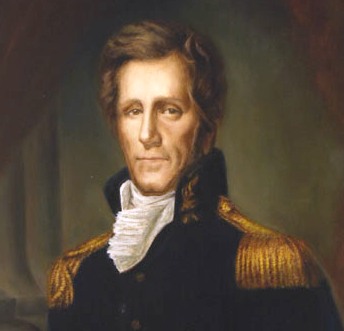Andrew Jackson was president during the Age of the Common Man. Jackson was the first president to be elected as a commoner. Although he did come from a wealthy background, he had a very simple childhood. Because of this, the American population was able to easily relate to him. He felt that commoners should run the government. He thought that the government should be based on a self-reliant middle class with ideas that emerged from liberal education and free press. Jackson insisted on rotation in office: when a new administration came to power, old administration would have to leave and return to “regular society.” Changes in electoral politics greatly influenced the Jacksonian Democracy. Jackson promoted the strength of the executive branch and the president, without regard for the congress. He also wanted to involve the public in the government. Jackson believed in involving all white men in government and politics, rather than just landowners. He also supported the patronage system that allowed politicians to appoint their supporters into office. He claimed that the patronage system would reduce the powers of the upper class and prevent aristocracy. Jackson used the Spoils System to give government jobs to his friends, and win support for his legislative program. Ultimately, Jackson had created a system to clear out elected officials in government opposing parties and replace them with his supporters as a reward for their help. With Congress controlled by his enemies, Jackson relied heavily on the power of the veto to block their moves.

Jacksonian Democracy was clearly opposed the the American System developed by Henry Clay. Jackson focused his presidency on two parts of the American System: the National Bank and protective tarrifs. Jackson did not support the National Bank because he feared that it favored the wealthy. He wanted to reduce the economic power that the bank held. In October of 1833 Jackson announced that federal funds would no longer be controlled by the National Bank. He ordered Roger Taney, Chief Justice of the Supreme Court, to remove all money from the bank. Jackson then evenly distributed that money to thirty-three banks set up across the nation. However, these individual banks eventually led to problems, because they were using their own currency. People would purchase federal land and pay with their own currency, and this money would be completely useless. To solve this problem, Jackson issued the Specie Circular. The Specie Circular stated that land could only be bought with money backed by gold or silver. Due to the Specie Circular, many banks failed, people entered bankrupcy and unemployment, and this led to the Panic of 1837. The tarrif of 1828 resulted in a major political crisis with South Carolina. They nullified the Tarrif of 1828. Although Jackson wanted to reduce national powers, he could not justify what South Carolina had done. They had opposed the constitution by wanting to nullify federal law, and Jackson stated that this could even be considered treason. Jackson requested congress to pass the Force Bill in 1833 which allowed him to use the army and navy to force South Carolina to obey national laws. Jackson then helped South Carolina through compromise by the Tarrif Act that provided for a gradual reduction in tax rates. The compromise worked and Sotuh Carolina took back its nullification of the tarrif.

No comments:
Post a Comment